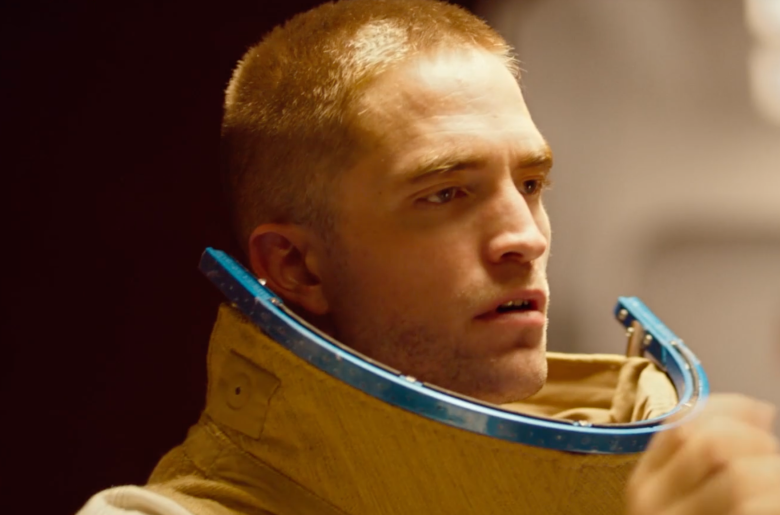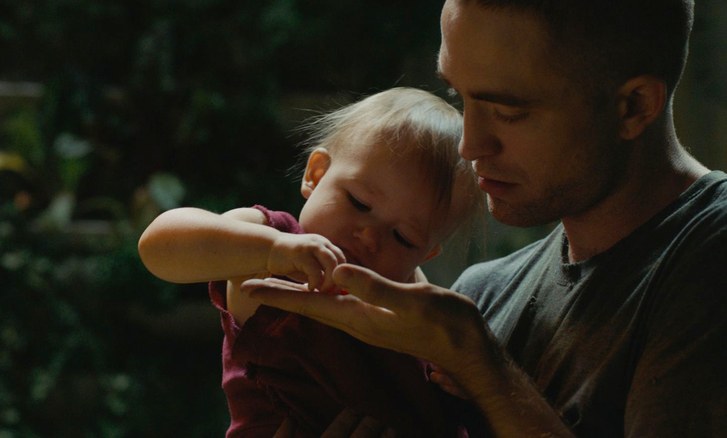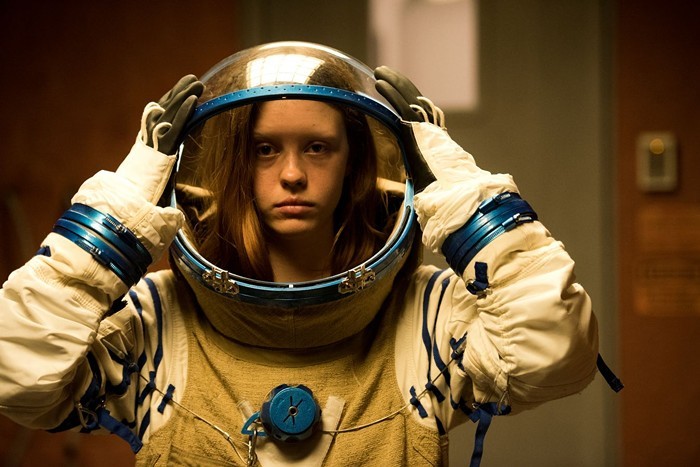
The spaceship has a garden. Somewhere, amid the instrument panels and the spartan bunks and the anti-gravity suits, there is a verdant room full of plants, moss, and dirt. It’s as if the astronauts, saddened by the prospect of leaving Earth behind, insisted on bringing a bit of earth along with them.
This contrast—between the personal and the fantastical, between presence and absence, between flowering life and merciless death—is emblematic of High Life, Claire Denis’ strange, frustrating, beguiling new film. Part sci-fi thriller, part philosophical meditation, it is always challenging, often boring, and occasionally mesmerizing.
A hero of European art cinema, Denis’s movies tend to be elliptical and intimate, which means they can also be—at least to this ugly American’s eyes—very slow. The opening stretch of High Life, which follows the drudging adventures of a solitary astronaut named Monte (Robert Pattinson), does little to reverse that impression. Space is a lonely place, and Denis is admirably committed to evoking the oppressive isolation that engulfs her protagonist. As Monte roams through and around the craft, making repairs and filing reports and disposing of waste, Denis conjures an atmosphere of dread and discomfort, enhanced by jagged editing and discordant sound effects. The result is both immersive and somewhat off-putting; you wonder how Monte got himself into this predicament and also if he’s ever going to do anything interesting. Imagine The Martian, only with the aura of pluck and good humor replaced by confusion and despair.

Yet unlike many stalwarts in survival stories, Monte is not entirely alone. He is joined instead by his infant daughter, Willow, who watches her father through TV screens and occasionally hears his voice through booming speakers. The practicalities of Monte’s parenthood may seem daunting, but while Denis pays them glancing attention—at one point, Willow screams so loudly into Monte’s headset, he staggers and drops a tool, watching feebly as it vanishes into inky blackness—she is more interested in the intersection between civilization and oblivion. How do you raise a child to grow up in a futureless world? Are we obligated to perpetuate our humanity when we’re no longer surrounded by humans?
These are the types of questions that animate High Life, which over time grows thornier, messier, and infinitely more interesting. Working with her longtime screenwriting partner Jean-Pol Fargeau, Denis structures the film in non-linear fashion, gently bending chronology back and forth like a vessel traversing the space-time continuum. She uses flashbacks with economy; a handful of quick-hitting shots—of a dead dog, a raised fist, a bloody stone—convey Monte’s backstory with impressive clarity. Gradually, a central narrative takes shape: He is the last surviving member of a crew composed entirely of death-row inmates, each of whom has been granted a sort of interstellar parole and sent on a mission to mine energy from a newly emergent black hole.

As a matter of social planning, this arrangement—lumping a bunch of murderers and rapists into a confined environment and expecting them to collaborate to execute a difficult assignment—may seem dubious. As a matter of entertainment, it carries an undeniable charge, one that Denis amplifies in surprising ways. She is a keen student of personal behavior and primal drives, which here means that she is thrillingly direct about sex; everyone in High Life is horny to one degree or another, and Denis explores the ensuing collision of hormones with a candor that is both lurid and oddly humane. The movie’s most startling and ghastly invention is The Box, a sort of pleasure dungeon that makes George Clooney’s contraption in Burn After Reading look like a child’s toy. Yet Denis wields these risqué elements in order to ask (ahem) probing questions, investigating how we interact with one another and how we channel our desires. She’s cooked up a human drama whose primary ingredients are semen and blood.
The people who populate her universe, however, are not especially well-defined. Denis plainly despises exposition—a jarring interview scene on a train seems to serve as a bone grudgingly thrown to a starved audience whose hand she otherwise refuses to hold—but she also struggles to imbue her secondary characters with any real personality. To the extent they hold their shape at all, it’s only because you recognize the actors playing them; Suspiria’s Mia Goth, for example, is a figure of volatility, while André Benjamin is a more pensive presence. The rest—a pilot, a captain, a creep—are largely indistinguishable, and while their actions may propel the plot, their motivations seem clumsy and haphazard.

Except, that is, for Juliette Binoche, who is wholly incapable of being dull. She portrays the ship’s doctor, a woman with an especially sordid history—her past crime is “the only one worthy of the name,” she boasts—and an even more insidious present agenda. High Life never feels more alive than when Binoche is on screen, sauntering through the frame with a raven mane and unnervingly intelligent eyes. She also brings out the best in Pattinson, as their shared scenes crackle with unpredictable energy; when Monte is by himself, the actor’s physicality remains spiky, but his bearing is often reserved to the point of flatness.
As with most modern stories set in space, High Life owes a debt to 2001, right down to its predictably ambiguous ending. But unlike most imitators of Stanley Kubrick’s classic, which tend to be streamlined and antiseptic, High Life’s aesthetic is grimy, bulky, and thoroughly lived-in. The vessel that the characters inhabit resembles a giant, boxy crate, coated with rust and suggesting a design team that prioritized crude functionality over comfort and polish. (Rather than bearing a name, the ship just features a numeral emblazoned on one side, telling you everything you need to know about how much society values its crew.) The film’s sound design deepens this sensation of unease, with blasts of drone and whispers of discontent. The result is less unpleasant than authentic; for an ostensible science-fiction tale, the movie possesses a laudable degree of realism. (Indeed, periodic shots of the menacing black hole look eerily similar to the photos of an actual black hole recently captured by scientists.)
As a story of survival and discovery, High Life is less entertaining than it might have been, occasionally meandering and stalling out. But in its final act, which features a quietly remarkable flash-forward, it becomes weirdly powerful. Denis has made a movie about a bunch of killers who head into space and cause hell, but she’s also done something compassionate and graceful; in a film laced with violence and terror, she’s located humanity’s capacity for gentleness and love. And even as the ship’s crew is gradually reduced in number with pitiless precision—in one scene, lifeless bodies tumble helplessly into space, cascading into the void—High Life grows increasingly empathetic. Denis seems to recognize that, while we may be creatures of lust and filth, we are also beings of beauty and hope.
Grade: B
Jeremy Beck is the editor-in-chief of MovieManifesto. He watches more movies and television than he probably should.
